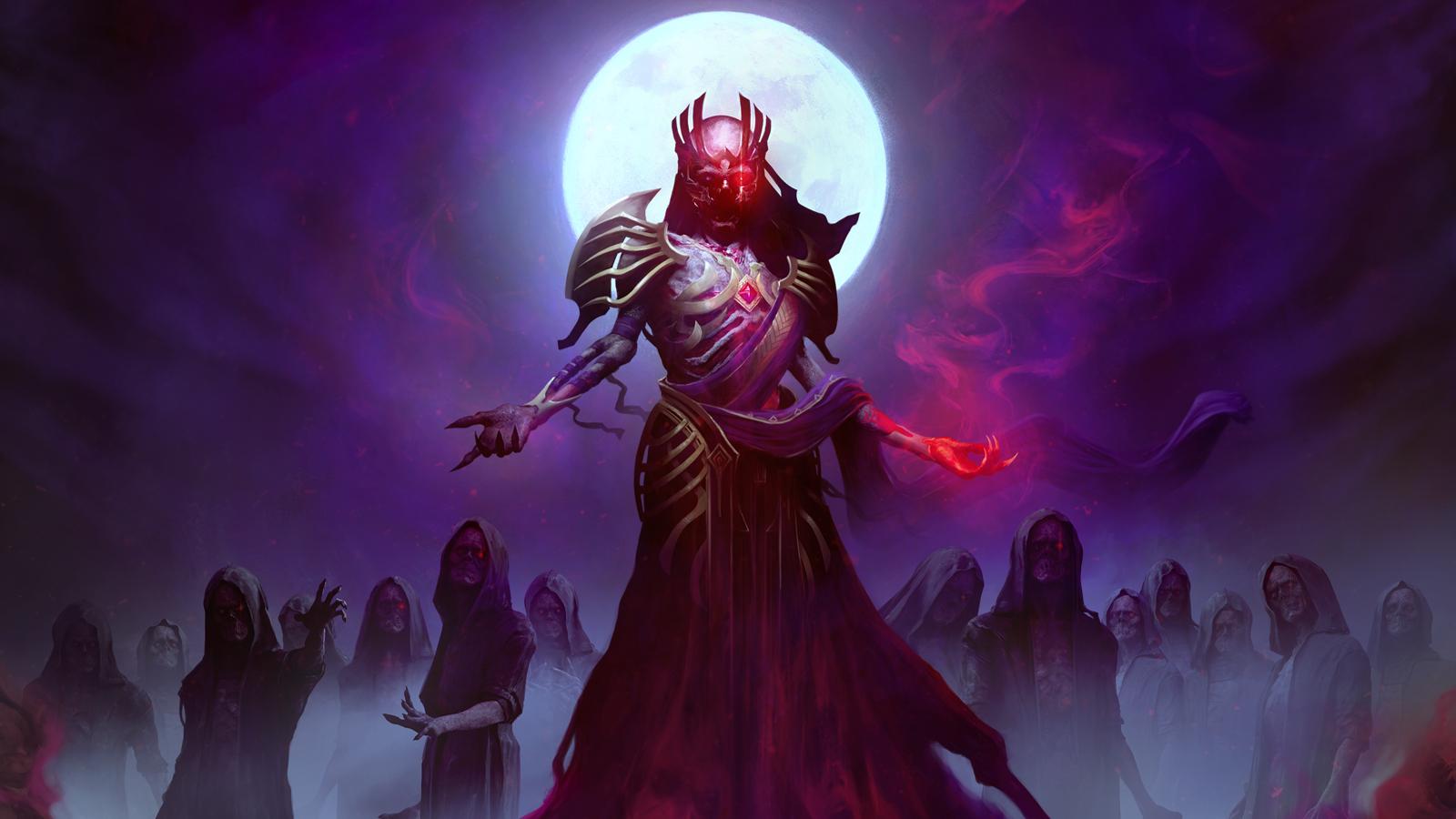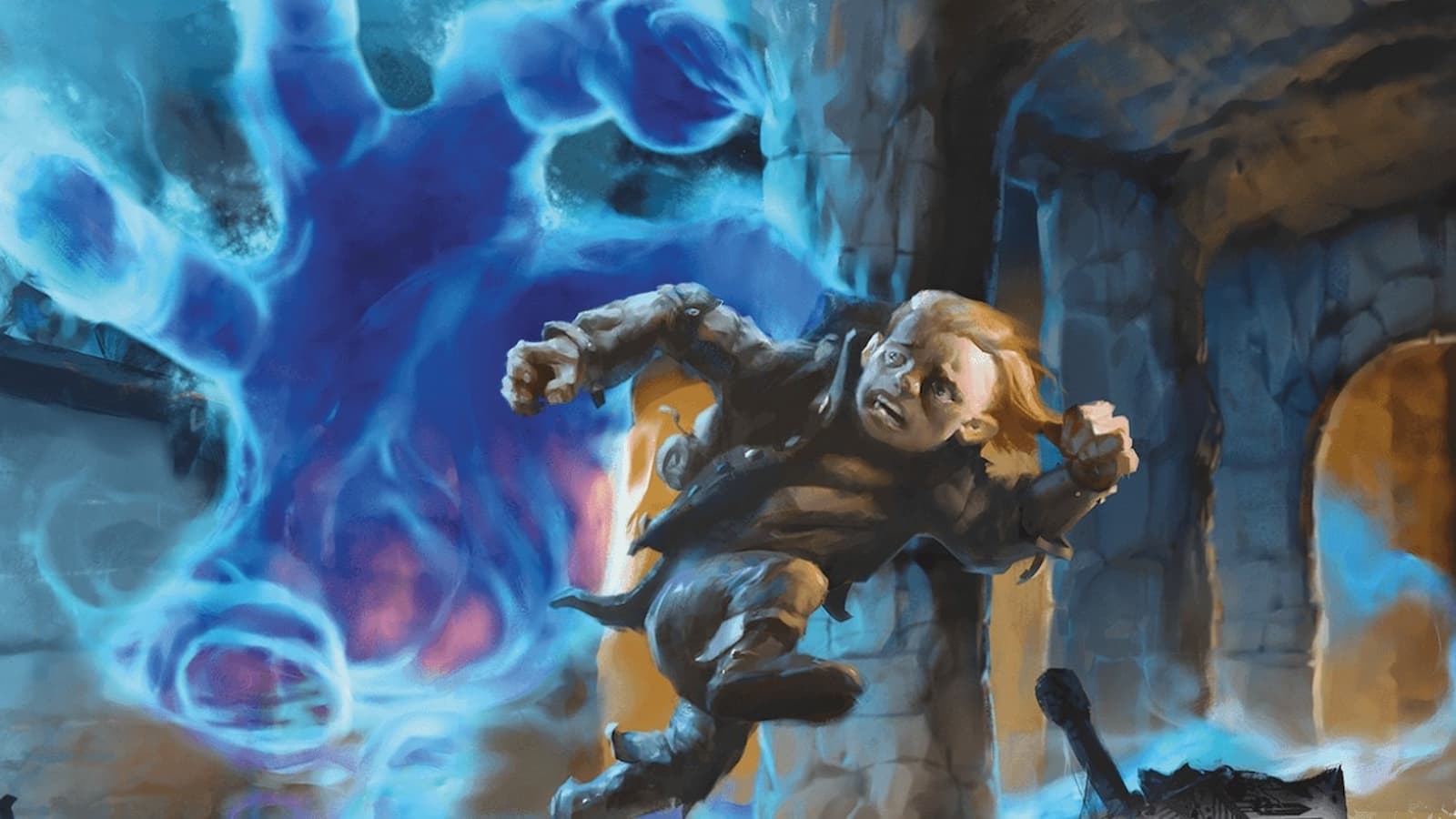D&D 5e Rogue guide: Best options for stealth and skills
 WOTC
WOTCRogue is one of D&D’s most beloved, classic classes. Equally skilled in deception and daggers, the Rogue is perfect for both newcomers and experts, and we’ll walk you through what you need to know before starting out with a Rogue in D&D 5e.
While opinions may differ over the popularity and effectiveness and many of D&D 5e’s classes, the Rogue has constantly shone in terms of player satisfaction. Rogue is one of the most versatile melee classes in the game, excelling both in and out of combat, but without excess complexity that might put off newcomers to the RPG.
We’ll catch you up on what you should know when playing a Rogue in D&D 5e.
Best Race options for Rogues in D&D 5e
 WOTC
WOTCWhen D&D 5e first launched, a character’s race was directly tied to the stat bonuses granted. However, since the release of Tasha’s Cauldron of Everything, Ability Score bonuses can now be placed where the player chooses at character creation.
If playing with the classic ability score rules, picking a playable race that boosts your Rogue’s key stats is crucial. However, if you’ve adopted Tasha’s variant rules for lineage, you have much more flexibility. Go with the playable race that appeals to you, or select something with interesting abilities to supplement your ideal play style.
Aarakocra
It cannot be overstated how useful flight can be for a player character. As one of the only playable races with access to a flying speed, Aarakocra make incredible Rogues through sheer mobility. Swooping in, dealing damage, then disengaging and flying out of reach makes up for Rogues’ smaller Hit Dice compared to many other melee classes.
Be sure to consult with the DM before playing a flying character, just so there aren’t any unexpected difficulties down the road.
Halfling
Nimble and dexterous, Halflings are a classic race for Rogue, with good reason. Halflings’ stat lines work perfectly for a Rogue, but so too does their innate Halfling Luck. Negating critical fails is an amazing feature, turning your rare fumble into one more chance at success. There’s a reason Bilbo was picked to be a burglar after all, halflings simply excel in this stealthy role.
Half-Elf
Half-Elves’ stat increases are the most flexible in all 5e, giving you plenty of room to build out your Rogue exactly as you’d like. Charisma is highly useful for social encounters, as are two skill proficiencies of your choice and the other two +1s can go wherever you please. Additionally, Fey Ancestry is highly useful to have in a pinch, granting advantage against being charmed.
Rogue Hit Dice: D8
Hit Dice determines both the increase to your health when leveling up and how much HP you can get back on a short rest.
Rogue’s Hit Dice is a D8; solidly middle-of-the-pack. A D8 prevents the Rogue from being as squishy as Wizards and Sorcerers but also keeps them from being as hardy as fellow melee options like Fighters, Rangers, and Paladins. Both up-close and ranged builds are possible for a rogue thanks to the D8.
With this limitation to their health, Rogues have to be smart in planning for encounters. Their Uncanny Dodge feature can help mitigate some damage taken, but it isn’t a perfect solution. Skirmishing, closing in for the kill, and backing off when in danger are all often necessary.
As Rogues are a short rest-focused class, Hit Dice are the only resource they really need to be concerned with spending, so keep stock and make sure you’ve got enough to get you through the adventuring day.
Rogue Ability Scores and Saving Throws
Here’s the order in which you should prioritize your ability scores in a typical Rogue build:
- Dexterity
- Intelligence or Charisma
- Constitution
- Wisdom
- Intelligence or Charisma
- Strength
Dexterity is the most important attribute for any Rogue to possess. It determines their aptitude in many of their most crucial skills, including Stealth and Acrobatics. Additionally, Dexterity will increase your chances of landing an attack, as well as the damage dealt by that attack.
Depending on the type of Rogue you’re looking to build, Intelligence or Charisma will be your next priority. Intelligence is excellent for cunning characters like Masterminds and spellcasting Arcane Tricksters. On the other hand, Charisma coupled with Rogues’ facility for skill checks allows them to serve as an incredible party face and is a necessity for Swashbucklers.
Constitution is useful for any character that will be getting up on the front lines and helps offset the Rogue’s lower-than-average Hit Die.
Wisdom isn’t necessarily crucial for a Rogue to have, but it’s always nice to have at least a little aptitude for in 5e thanks to the abundance of Wisdom saves and key skills like Perception.
Depending on which of Intelligence or Charisma you aren’t building around, feel free to neglect the other stat a little, as it won’t matter much for the role you’ve chosen.
As you can see, Strength matters very little for a Rogue. Hitting with heavy things simply isn’t going to be your style, as finesse is far more crucial.
Rogues have proficiency in Dexterity and Intelligence saves, preventing a good deal of physical damage and shoring up their minds against psionic influence.
Rogue starting skills and proficiencies
Rogues start out with the following proficiencies:
- Light armor
- Simple weapons, hand crossbows, longswords, rapiers, shortswords
- Thieves’ tools
- Dexterity and Intelligence saves
Additionally, Rogues can choose four out of the following skills to be proficient in:
- Acrobatics
- Athletics
- Deception
- Insight
- Intimidation
- Investigation
- Perception
- Performance
- Persuasion
- Sleight of Hand
- Stealth
Rogue Class Features
 WOTC
WOTCExpertise makes Rogues skill masters
At first level, Rogues have access to Expertise. This feature allows you to select two skills in which you are already proficient – or one skill and Thieves’ Tools – and double your proficiency bonus in each. At sixth level, two more skills can be chosen for Expertise.
This feature is so useful that a single-level multiclass dip into Rogue is highly desirable for many classes looking to boost the effectiveness of their skills.
Sneak Attack turns Rogues deadly
As their other first-level feature, Sneak Attack is perhaps the most well-known part of the entire Rogue toolkit. Where other Martial classes will focus on making multiple big swings in the same turn, Rogues tend to focus on one precision attack for massive damage. This all-or-nothing fighting style can be fairly dynamic and is a big part of the Rogue’s appeal.
Sneak Attack can be performed whenever a Rogue rolls an attack with an advantage, or when they attack an enemy while an ally of theirs is within five feet of that enemy. The second case does not allow for Sneak Attack if the enemy is incapacitated or the roll is rolling with disadvantage. In either case, the attack must be using a weapon with the Finesse or Ranged property.
Whenever you make a successful Sneak Attack, you can add a number of D6s to the attack’s damage, depending on your Rogue level. At first level, you add a single D6, but the amount increases as your Rogue levels up.
Sneak Attack can only be triggered once per turn. However, crucially, this is not the same thing as once per round. When fighting up close, Rogues will often want to keep their Reaction ready for attacks of opportunity. This is because Sneak Attack can trigger again outside of their own turn.
Thieves Cant is a secret code for Rogues in D&D
Thieves Cant is a much more RP-heavy tool than Rogue’s first two features but fits in well with their shady dealings. As the Rogue’s final first-level feature, Thieves’ Cant is a spoken and written code that can be used to convey hidden messages only to those who also have knowledge of Thieves’ Cant.
While hidden communication in D&D is possible through magic and psionics, this feature uses no resources and is excellent for getting across crucial information in unsafe suroundings.
Cunning Action makes good use of the Rogue’s bonus action
One of the best parts of playing a Rogue is the feeling of having a ‘full turn.’ While many other classes will only use their movement and action each turn, Rogues almost always have an effective use for their Action, Bonus Action, Reaction, and Movement every turn.
Cunning Action gives Rogues several choices for their Bonus Action at second level. It grants Rogues the ability to take the Dash, Disengage, or Hide actions as a bonus. This increases the Rogue’s potential speed drastically while also allowing them the option of getting out of the fray safely and setting up a potential future Sneak Attack from the relative safety and advantage of Hide.
Steady Aim is one of Tasha’s best additions
Tasha’s Cauldron of Everything comes with many optional class features to adjust and balance 5e’s classes, and Steady Aim is right up there with the best of them.
The conditions for Sneak Attack can sometimes be difficult for a Rogue to set up, and Steady Aim negates some of that trickiness once the Rogue acquires it at level three. As long as a Rogue does not use any of their movement during their turn, they can use a bonus action to grant advantage on their next attack.
Uncanny Dodge is a crucial defensive technique
Reactions aren’t only potent offensive tools for Rogues, they can be used to great defensive effect too, once Uncanny Dodge is acquired at level five. When an attacker that the Rogue can see hits them with an attack, Uncanny Dodge can be used as a reaction to halve that attack’s damage. While it can take some careful decision-making to decide when best the use Uncanny Dodge, it remains an invaluable tool in the Rogue’s arsenal.
Evasion can completely cancel damage
Evasion is one of the best features that the Rogue gains access to and is unlocked at seventh level. With Evasion, whenever the Rogue succeeds on a Dexterity save and would normally take half damage, instead, they take no damage at all.
Reliable Talent makes failure (almost) impossible for Rogues in D&D
For any player that manages to take their Rogue all the way to level 11, Reliable Talent is an incredible payoff. With Reliable Talent, whenever a Rogue makes an ability check using a skill they’re proficient in, they can treat any d20 roll of nine or lower as a ten. This, coupled with Expertise, can potentially turn even a natural 1 into a result somewhere in the 20s.
Rogue Subclasses
The Rogue subclasses included in D&D 5e’s Player’s Handbook are detailed below. Additional subclasses for the Rogue – and 5e’s other classes – can be found in sourcebooks like Xanathar’s Guide to Everything and Tasha’s Cauldron of Everything.
Rogues unlock their subclasses at level 3.
Assassin
A blade in the dark, a drop of poison in the wine, Assassin fits the deadly Rogue fantasy to a tee. Assassins excel in finishing combat before it ever really begins, being especially dangerous during the first turn and when enemies are surprised.
Later Assassin levels grant RP features that revolve around establishing false identities and perfectly slipping into place to take out a target with massive damage.
Thief
The classic larcenous scoundrel that many associate with Rogues. Thief Rogues have nimble hands and nimbler reflexes, expanding their Cunning action options, rolling Stealth with advantage in certain situations, and more.
Additionally, higher-level Thieves can use magical items that would normally be restricted to other classes, granting a level of freedom in gearing up your late-game Rogue.
Arcane Trickster
A versatile, effective subclass that always has a trick up its sleeve. Becoming an Arcane Trickster allows the Rogue to start slinging spells, granting them access to a limited number of spell slots and certain spells from the Wizard list.
Arcane Tricksters excel in mixing magic with their pre-existing skills, gaining an invisible Mage Hand that can be used for picking locks and swiping purses, while later levels force enemies to roll at disadvantage against the Trickster’s spells when they are cast from hiding.
If you click on a product link on this page we may earn a small affiliate commission.



